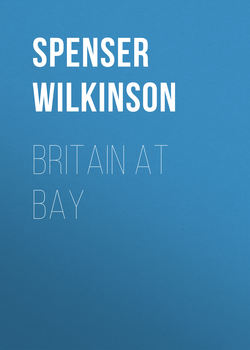Читать книгу Britain at Bay - Spenser Wilkinson - Страница 6
VI
THE BALANCE OF POWER
ОглавлениеWe have seen what a splendid prize was the result of British victory at sea, supplemented by British assistance to other Powers on land, a century ago. We have now to ask ourselves first of all how it came about that Great Britain was able to win it, and afterwards whether it was awarded once for all or was merely a challenge cup to be held only so long as there should be no competitor.
The answer to the first question is a matter of history. England was peculiarly favoured by fortune or by fate in the great struggles through which, during a period of three hundred years, she asserted and increased her superiority at sea until a century ago it became supremacy. She rarely had to fight alone. Her first adversary was Spain. In the conflict with Spain she had the assistance of the Dutch Provinces. When the Dutch were strong enough to become her maritime rivals she had for a time the co-operation of France. Then came a long period during which France was her antagonist. At the beginning of this epoch William III. accepted the British crown in order to be able to use the strength of England to defend his native country, Holland. His work was taken up by Marlborough, whose first great victory was won in co-operation with the Imperial commander, Prince Eugene. From that time on, each of the principal wars was a European war in which France was fighting both by sea and land, her armies being engaged against continental foes, while Great Britain could devote her energies almost exclusively to her navy. In the Seven Years' War it was the Prussian army which won the victories on land, while small British forces were enabled by the help of the navy to win an Empire from France in Canada, and to lay the foundations of the British Empire in India. In the war of American Independence, Great Britain for once stood alone, but this was the one conflict which contributed little or nothing towards establishing the ascendency of the British navy. Great Britain failed of her object because that ascendency was incomplete. Then came the wars of the French Revolution and Empire in which the British navy was the partner of the Austrian, Prussian, Russian, and Spanish armies.
These are the facts which we have to explain. We have to find out how it was that so many continental nations, whether they liked it or not, found themselves, in fighting their own battles, helping to bring about the British predominance at sea. It must be remembered that land warfare involves much heavier sacrifices of life than warfare at sea, and that though Great Britain no doubt spent great sums of money not merely in maintaining her navy but also in subsidising her allies, she could well afford to do so because the prosperity of her over-sea trade, due to her naval success, made her the richest country in Europe. The other nations that were her allies might not unnaturally feel that they had toiled and that Great Britain had gathered the increase. What is the explanation of a co-operation of which in the long run it might seem that one partner has had the principal benefit?
